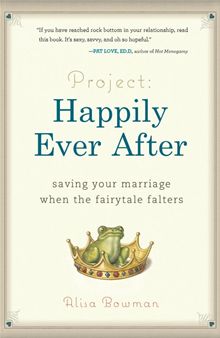By Alisa Bowman
About seven years ago, our toddler ran away from us at the grocery store. I chased him into the pasta aisle where he was holding a big jar of red sauce. My heart rate sped up as I realized I was about to become that parent, the mother who watches her child smash a jar onto the floor of aisle 6 and then walks away as if nothing happened.
In that moment, I understood why parents do things like that. It all became clear. They are just too exhausted, unappreciated, overwhelmed and resentful to have to deal with one more mess.
That is why I sweet-talked that jar of sauce out of my kid’s sticky little hands as if it were the most precious and fragile family heirloom. I got it back on the shelf. Then I realized that my son had run away again.
After I finally tackled him and put him in a football carry, I found my husband. I was still out of breath from chasing our son down. In my husband’s trademark snotty voice, he said, “While you were having a good time, I have been here trying to figure out what to buy.”
That night I came home and started writing a novel about a woman who kills her husband and gets away with it.

Another time my husband took our son, then 2 1/2 to the mall. My husband didn’t bother to ask him if he needed to go to the bathroom. Therefore he peed his pants. He didn’t pack an extra outfit, either. So after removing my son’s urine soaked clothes, he carried him out of the mall and put him in his car seat naked. When he got home, my husband said in that same surly voice, “Because you didn’t put an extra outfit in the car, he had to sit in his car seat naked.”
That night I planned his funeral down to the lamb on a stick I would serve the mourners.
I could tell you dozens more stories. What’s interesting about them is that, in isolation, none of them sound all that bad. When I talk about them, many people look at me and say, “You wanted him dead over that?”
No, it was never over just that. I would plan his funeral over dozens of insults, slights, misunderstandings and hurtful incidents that had spanned over many years. I did it because, for us, nothing was going on in the bedroom other than him snoring and me punching him in the arm when he did so. Nothing was being said over dinner, either.

The life had drained out of our marriage slowly and steadily.
Each new argument was like a paper cut. Taken alone, it wasn’t a big deal. When added to all of the other problems, it was nearly lethal.
By the time our son was nearly three, I was planning my escape. On Mother’s Day I had dinner with a divorced friend. For 45 minutes, I ranted about my husband and tried to convince her that he was evil—a mistake, a person not good enough for me, someone I should have never married in the first place.
She listened patiently.
Then she asked, “What have you done to save your marriage?”
I got tongue tied and then red in the face.
And then I admitted that I had tried nothing. She made me promise to try something, marital counseling perhaps. If it didn’t work, then “sure,” she said, “get a divorce.”

I didn’t try marital counseling. I decided to read my way to a better marriage instead. I bought book after book. I studied Internet site after site.
And I tried tip after tip.
Oddly, some of it worked. Slowly over time, I was struck with three revelations.
- My husband wasn’t as evil as I’d once thought. Clueless and unable to read my mind? Yes. Evil? No. The man actually wanted to make me happy. He just didn’t know how.
- He wasn’t the source of all of our marital problems. I was. Once I learned how to be assertive without being aggressive, I was able to improve every area of our marriage—including our sex life.
- He didn’t piss me off on purpose. His surly tone was usually a result of his own inability to communicate coupled with a fear of confrontation. He had no idea I found his tone so scary and condescending. When I told him about it, he was floored.
It wasn’t until later, after we renewed our vows, that I was struck with two more revelations.
The fourth one was this: More people want their spouses to conveniently drop dead than anyone suspects. I learned this after I started talking about my own death fantasies. Some people stared at me blankly when I talked about it, only to pull me aside later and whisper, “I’ve so been there.” Others laughed loudly and told me and everyone in the room about theirs.
The fifth revelation came as I started talking to couples who had been married for 20, 30, 40 or 50 or more years about their marriages. “Did you ever go through a rough patch?” I asked. Usually one or both of them would laugh and say, “Oh yes did we ever! Let me tell you….”
After they finished telling me about all of the hard times, I would ask, “Do you regret staying together?” Not once has a couple answered that question with a, “Yes.”
If you are currently in what I have come to call The Planning The Funeral Stage of Marriage, that should give you hope. I hope my story gives you hope, too. So should the stories of a growing number of couples who are fighting for their marriages and finding ways to make it work.
More and more couples are realizing that being happily married is not a mysterious sensation spread through fairy dust. Rather it’s a skill. You can either learn and perfect that skill now with your current spouse, or you can learn it with the next one. Either way, to be happily married, you’ve got to perfect it.

Here are a few tips:
- Practice the art of communication. Communication is a skill, one that improves with practice. Practice it everywhere you go and during every conversation you have. Listen with all of your attention and rephrase what you think you heard to make sure you got it right. Practice asking questions and see just how much information you can get out of someone. Practice asking for what you want in a low voice, slowly, without tension.
- Be the change you want to see in your marriage. If you want more conversations, start them. If you want a spicier sex life, spice it up yourself. If you want to be heard, improve your delivery. It’s a lot easier to change yourself than it is to change your spouse. And by changing you, your spouse will change, too.
- Get over the idea of fairness. This is a tough lesson, but an important one. The process of saving your marriage isn’t fair. There are going to be times when you have to do most of the work. Get over it.
Remember, deciding to work on your marriage requires a leap of faith, because you truly will never know the results until you try. But I encourage you to take that leap for your partner and yourself. No matter where it leads, you will never regret trying.
~Alissa
—
About
Alisa Bowman is the author of Project: Happily Ever After, a memoir of how she saved her marriage. You can visit her at AlisaBowman.com.
Tell us, have you been close to the end of the lifeline on your marriage? What did you do? Share YOUR tips to a happy marriage. Feel free to comment anonymously so perhaps your story can help others.








My name is Mariana Williams testimony to share to my people, i cant keep this alone.brothers and sisters you can Save your marriage today, if you are sick, you need promotion, any kind of problem apart from HIV, this man is here to help you out am promising you that any problem you may find yourself brothers and sisters i, Mariana am telling you right now all your problems are all over am garanting you that try and see yourself and you will be the one to testify DR KOFI is here to help us, he base in ghana. any deficulties you may have right now DR KOFI is here because of you and i. he does not request for your money after everything u can appreciate him with anything that come from your mind, very nice man, he is God sent to us. Am not ungreateful person this great man once help of recent he has a very great thing in my life i really appreciate him so i need to post this so that my people out there can see this kind of a man have not see him before very nice and kind he does not have for money God have been using this man to help so many people in ghana. Am here to help him spread his work across the whole world. am now his agent i have volunteer to help him spread this good news, am 95 percent sure for his great work. a old man with a son and a daugther and lovely wife. you and i know that you out there you need his help, here my email [email protected]. thanks
How to save my broken marriage was my greatest weakness, I faced a broken marriage which I did not wish to give up. My husband was very hot tempered, he always pushes blames to me for causing our marital drawback. Though we are married for 8 years with a daughter but we were still lonely and hopeless in marriage. He gave me a lot of excuses why we cannot cohabit unless I seek spiritual help from either spell doctor to deterge our marriage. From the reviews, I read I learned about spell and also Dr. Wakina Love Spell Temple via dr.wakinalovetemple@gmail. com. The rendered help by Wakina was everything we need to restart our union. I am happy to have seek the help of spell doctor just as advised by Husband. He is the MAN now, the man of my dream.